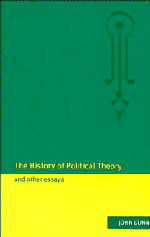Book contents
- Frontmatter
- Contents
- Preface
- Acknowledgements
- 1 Introduction
- 2 The History of Political Theory
- 3 Contractualism
- 4 Political obligation
- 5 Trust
- 6 The claim to freedom of conscience: freedom of speech, freedom of thought, freedom of worship?
- 7 Property justice and common good after socialism
- 8 The dilemma of humanitarian intervention: the executive power of the Law of Nature, after God
- 9 Specifying and understanding racism
- 10 Political science, political theory and policy making in an interdependent world
- 11 Democracy: the politics of making, defending and exemplifying community: Europe 1992
- 12 Is there a contemporary crisis of the nation state?
- 13 Political and economic obstacles to rapid collective learning
- 14 The heritage and future of the European left
- Index
5 - Trust
Published online by Cambridge University Press: 05 February 2010
- Frontmatter
- Contents
- Preface
- Acknowledgements
- 1 Introduction
- 2 The History of Political Theory
- 3 Contractualism
- 4 Political obligation
- 5 Trust
- 6 The claim to freedom of conscience: freedom of speech, freedom of thought, freedom of worship?
- 7 Property justice and common good after socialism
- 8 The dilemma of humanitarian intervention: the executive power of the Law of Nature, after God
- 9 Specifying and understanding racism
- 10 Political science, political theory and policy making in an interdependent world
- 11 Democracy: the politics of making, defending and exemplifying community: Europe 1992
- 12 Is there a contemporary crisis of the nation state?
- 13 Political and economic obstacles to rapid collective learning
- 14 The heritage and future of the European left
- Index
Summary
Few modern philosophers are convinced that the nature and availability of trust between human beings really is a central issue in the theoretical understanding of politics. This is in some ways surprising, since the most prominent recent movement in political philosophy, the largely North American dialogue about the content of social justice inaugurated by John Rawls (1972), has been strongly committed to the theoretical centrality of the idea of a contract: a free, but binding, agreement. The normative force of the standard of uncoerced choice by free and rational agents unites the great seventeenth-and eighteenth-century philosophical exponents of natural law and natural rights with modern contractarian critics of the claims of utility to serve as a uniform criterion for political and social decisions. But the two groups of thinkers differ drastically in their estimate of the practical significance of that normative force.
For early modern theorists of natural law (Locke, Rousseau, even Hobbes), there were the closest of ties between voluntary self-commitment, the obligatory force of a contract or promise, and the psychological and social foundations of human collective life. Fides, the duty to keep faith and the practical virtue of discharging that duty in the dependable fashion, was the foundation for social life in its entirety (Dunn 1985, chapter 2), the key practical capacity which made it possible for human beings to live with one another on tolerable terms at all.
- Type
- Chapter
- Information
- The History of Political Theory and Other Essays , pp. 91 - 99Publisher: Cambridge University PressPrint publication year: 1995
- 2
- Cited by



